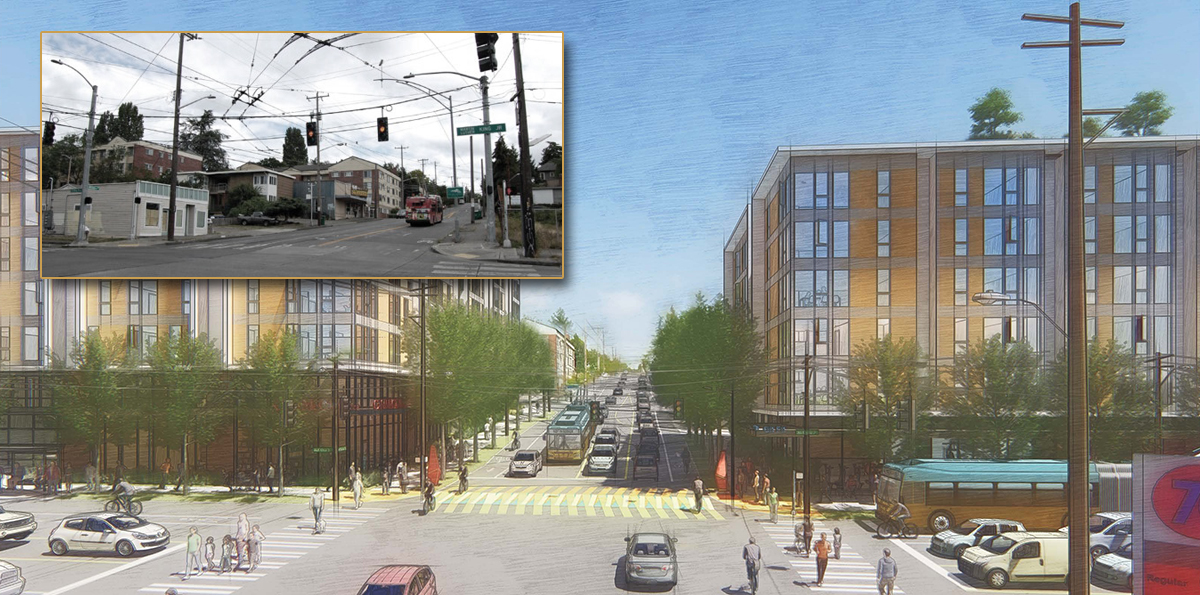
A conceptual drawing of the Mount Baker Housing Authority Gateway project in Seattle's Mount Baker neighborhood. After cleanup, the redeveopment will include affordable housing.
We are now accepting applications for our new Affordable Housing Cleanup Grant Program. This innovative program will provide planning and cleanup grants for contaminated sites intended for affordable housing development. The program will support communities by:
- Cleaning up environmental contamination for residential use.
- Providing meaningful community engagement that informs and shapes decisions throughout the cleanup process.
- Integrating longer-term goals of shared economic and community asset building across a diverse population.
Our competitive grant program reflects Ecology’s commitment to environmental justice by investing in direct community benefits. These investments help reduce gentrification and displacement of low income communities that often follow cleanup activities and redevelopment.
A unique feature of our program is the ability to provide grant funding to nonprofits and other non-governmental entities. This means we have the ability to work in partnership with socially responsible developers to produce much needed affordable housing in Washington.
Who can apply?
Any person or organization planning to clean up a contaminated site for redevelopment into affordable housing can apply for a grant. We are accepting applications for cleanup grants until March 1, 2022. Successful applicants will receive funding in the second half of 2023. We will solicit applications for planning grants summer 2023.
Project criteria
- Meets affordable housing definition and includes a minimum of 20% affordable housing in the proposed redevelopment.
- Retains affordable housing for 30 years through property restrictions that will be tracked.
- Proposes to fully clean up a contaminated site within an incorporated city, town, or urban growth area owned, or planned to be owned, by the applicant.
Types of grants
There are two types of grants:
Planning: Provides seed money to prospective purchasers or property owners to help answer early questions about the potential contamination risk of a property proposed for development into affordable housing. Funded activities can include environmental assessments or outreach to the community. A solicitation for these grants will occur in 2023.
Cleanup: Provides cleanup funding after the site is under a formal agreement with Ecology.
Why it matters
Connecting contaminated site cleanup and affordable housing redevelopment invests in a greater good beyond the economic and environmental benefits. Addressing contamination and providing affordable housing helps preserve a community’s character and means residents are less likely to be displaced by expensive redevelopment.
Reducing cleanup costs creates affordable housing opportunities
Our program reduces cleanup costs and eases the way for building affordable housing by providing grants to clean up contaminated sites intended for affordable housing development.
The cost of cleaning up contaminated properties is usually part of the redevelopment price — making developing raw land less risky and expensive. Higher costs and risks associated with redeveloping a contaminated site also makes it less likely affordable housing will be part of new construction.
Redeveloping cleanup sites reduces urban sprawl
As Washington’s cities continue to grow rapidly, new housing and businesses are often built on previously undeveloped land. Ecology is tracking nearly 6,000 sites with suspected or known contamination, many of which are in the middle of urban areas. Cleaning up these sites offers opportunities to create safe, affordable housing.
Grant program history
In 2017, the Governor directed Ecology to explore policy options to incentivize environmental cleanups that could provide land for affordable housing.
The 2018 Washington Legislature supported linking cleanups with affordable housing. As a result, we worked with the Department of Commerce to start a pilot program to provide funding for cleanup sites developed into affordable housing. The success of these early projects paved the way for the Affordable Housing Cleanup Grant Program.
Learn more about the specific pilot projects and grant opportunities on our Affordable Housing-related Cleanup webpage.

